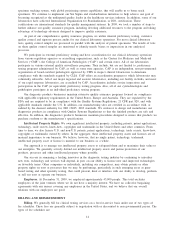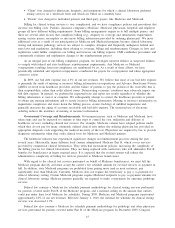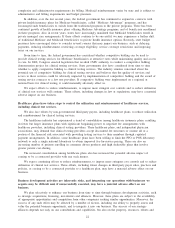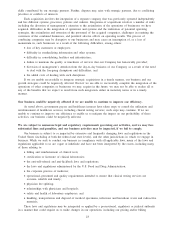Quest Diagnostics 2009 Annual Report Download - page 32
Download and view the complete annual report
Please find page 32 of the 2009 Quest Diagnostics annual report below. You can navigate through the pages in the report by either clicking on the pages listed below, or by using the keyword search tool below to find specific information within the annual report.complexity and administrative requirements for billing. Medicaid reimbursement varies by state and is subject to
administrative and billing requirements and budget pressures.
In addition, over the last several years, the federal government has continued to expand its contracts with
private health insurance plans for Medicare beneficiaries, called “Medicare Advantage” programs, and has
encouraged such beneficiaries to switch from the traditional programs to the private programs. There has been
continued growth of health insurance plans offering Medicare Advantage programs, and of beneficiary enrollment
in these programs. Also in recent years, states have increasingly mandated that Medicaid beneficiaries enroll in
private managed care arrangements. If these efforts continue to be successful, we may experience a further shift
of traditional Medicare and Medicaid beneficiaries to private health insurance options. Recently, state budget
pressures have encouraged states to consider several courses that may impact our business, such as delaying
payments, reducing reimbursement, restricting coverage eligibility, service coverage restrictions and imposing
taxes on our services.
From time to time, the federal government has considered whether competitive bidding can be used to
provide clinical testing services for Medicare beneficiaries at attractive rates while maintaining quality and access
to care. In 2008, Congress enacted legislation that revoked CMS’ authority to conduct a competitive bidding
demonstration project for clinical testing services. State governments also have considered from time to time
whether to apply competitive bidding to clinical testing services. The industry remains concerned about the
potential use of competitive bidding for clinical testing services and believes that the quality of services and
access to those services could be adversely impacted by implementation of competitive bidding and the award of
testing service contracts to a few test providers. If competitive bidding were implemented on a regional or
national basis for clinical testing, it could materially adversely affect us.
We expect efforts to reduce reimbursements, to impose more stringent cost controls and to reduce utilization
of clinical test services will continue. These efforts, including changes in law or regulations, may have a material
adverse impact on our business.
Healthcare plans have taken steps to control the utilization and reimbursement of healthcare services,
including clinical test services.
We also face efforts by non-governmental third party payers, including healthcare plans, to reduce utilization
and reimbursement for clinical testing services.
The healthcare industry has experienced a trend of consolidation among healthcare insurance plans, resulting
in fewer but larger insurance plans with significant bargaining power to negotiate fee arrangements with
healthcare providers, including clinical testing providers. These healthcare plans, and independent physician
associations, may demand that clinical testing providers accept discounted fee structures or assume all or a
portion of the financial risk associated with providing testing services to their members through capitated
payment arrangements. In addition, some healthcare plans have been willing to limit the PPO or POS laboratory
network to only a single national laboratory to obtain improved fee-for-service pricing. There are also an
increasing number of patients enrolling in consumer driven products and high deductible plans that involve
greater patient cost-sharing.
The increased consolidation among healthcare plans also has increased the potential adverse impact of
ceasing to be a contracted provider with any such insurer.
We expect continuing efforts to reduce reimbursements, to impose more stringent cost controls and to reduce
utilization of clinical test services. These efforts, including future changes in third-party payer rules, practices and
policies, or ceasing to be a contracted provider to a healthcare plan, may have a material adverse effect on our
business.
Business development activities are inherently risky, and integrating our operations with businesses we
acquire may be difficult and, if unsuccessfully executed, may have a material adverse effect on our
business.
We plan selectively to enhance our business from time to time through business development activities, such
as strategic acquisitions, licensing, investments and alliances. However, these plans are subject to the availability
of appropriate opportunities and competition from other companies seeking similar opportunities. Moreover, the
success of any such effort may be affected by a number of factors, including our ability to properly assess and
value the potential business opportunity, and to integrate it into our business. The success of our strategic
alliances depends not only on our contributions and capabilities, but also on the property, resources, efforts and
22
























